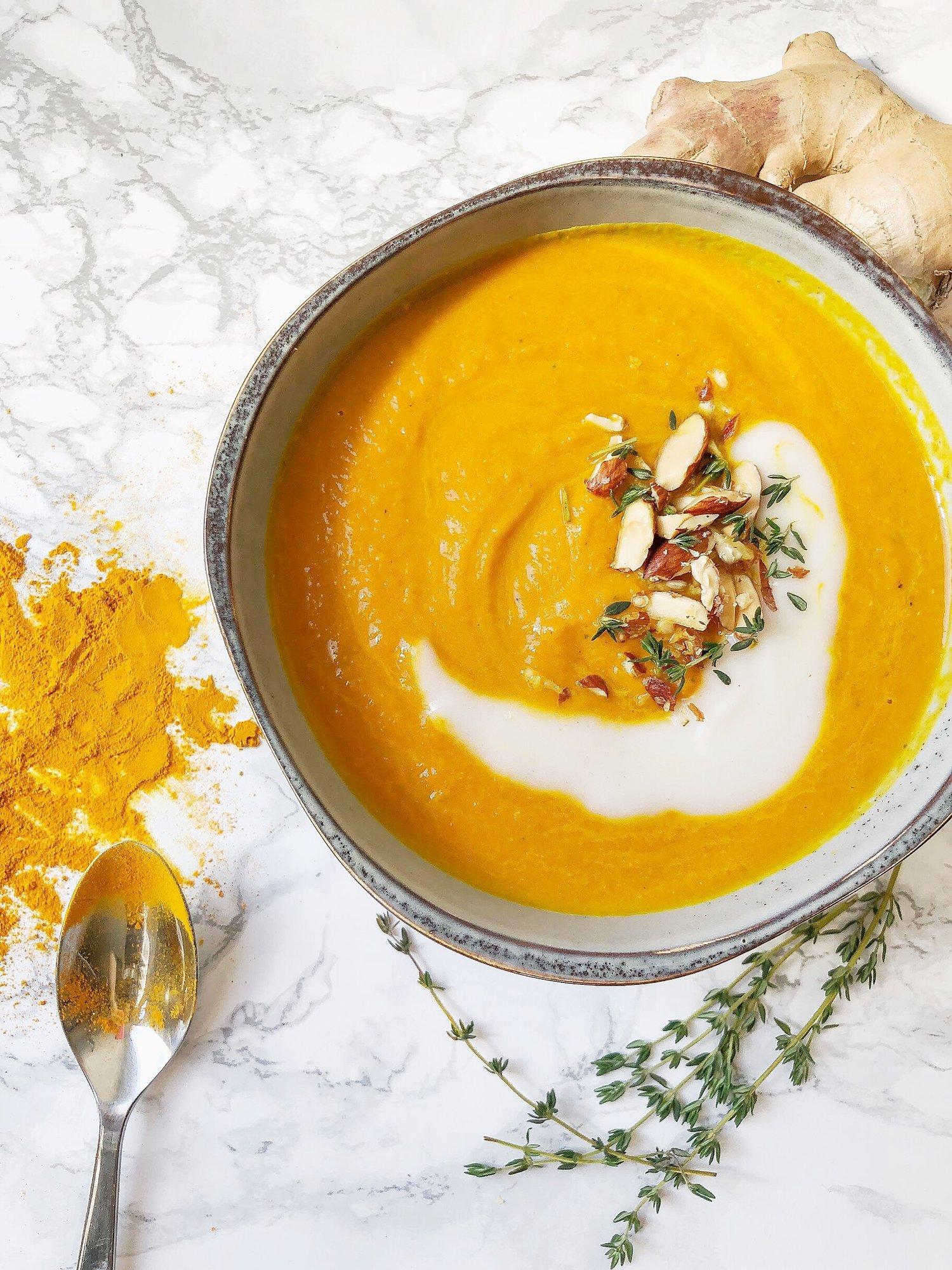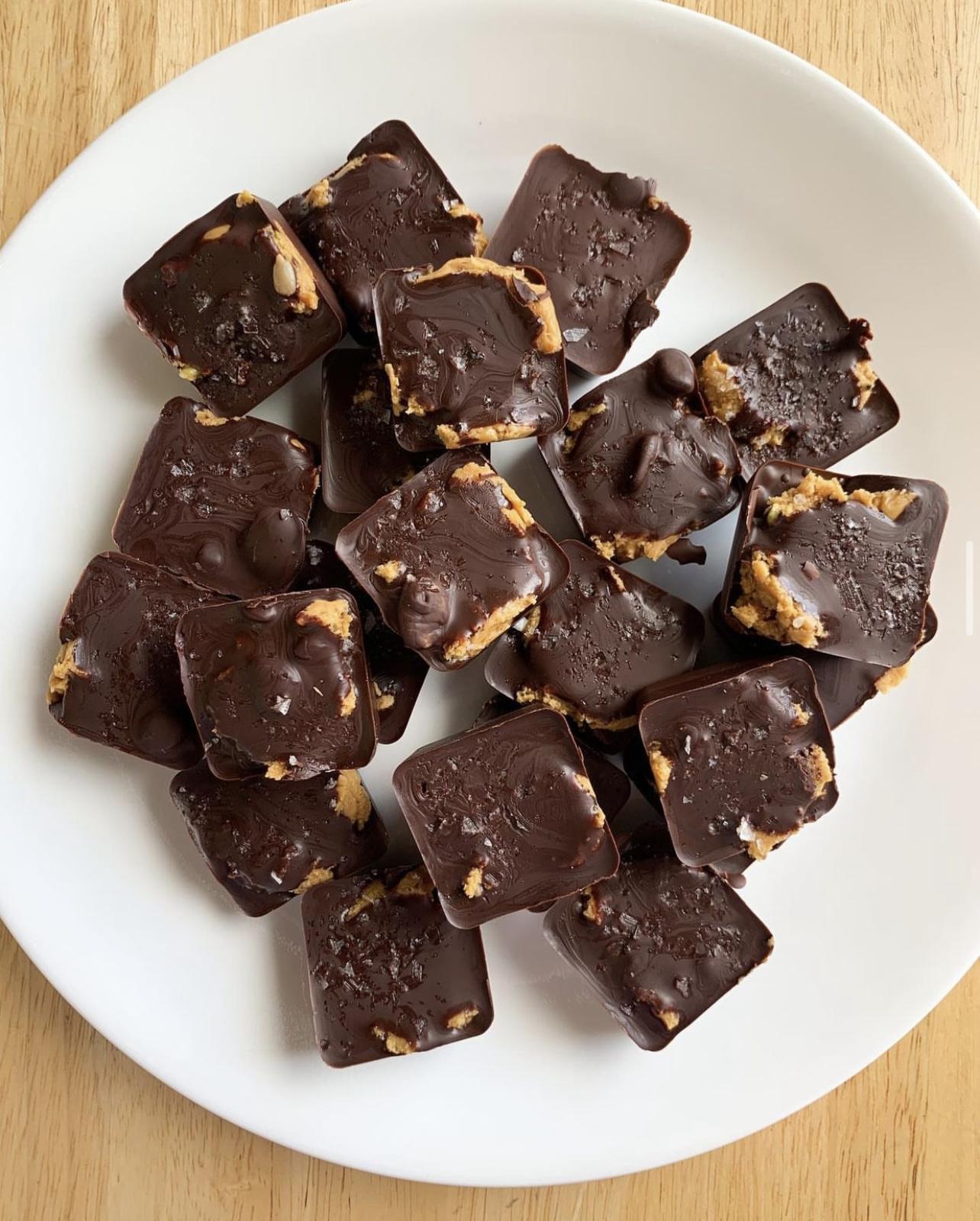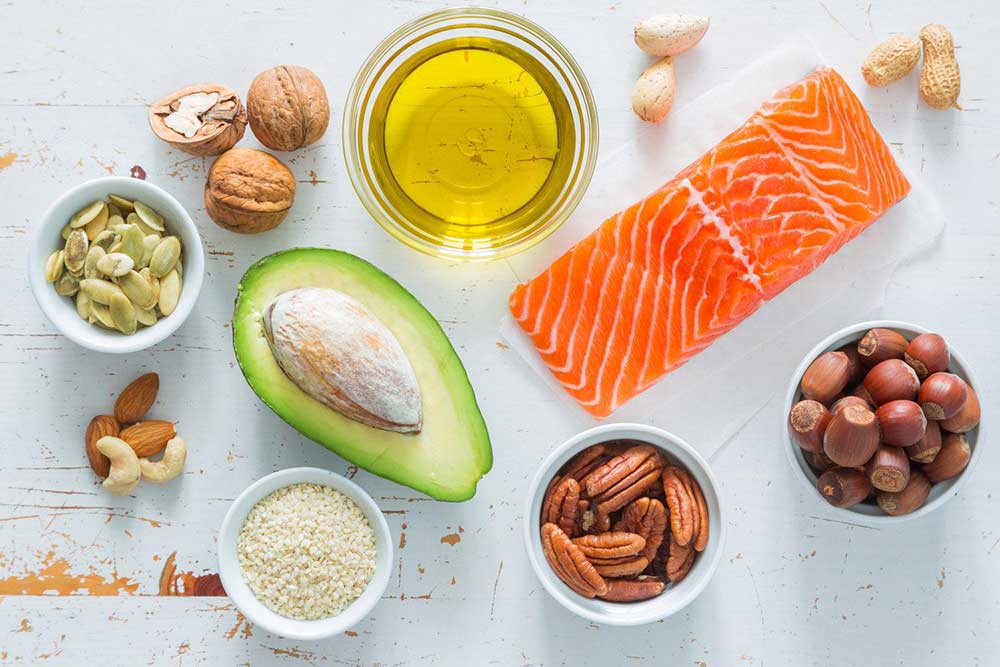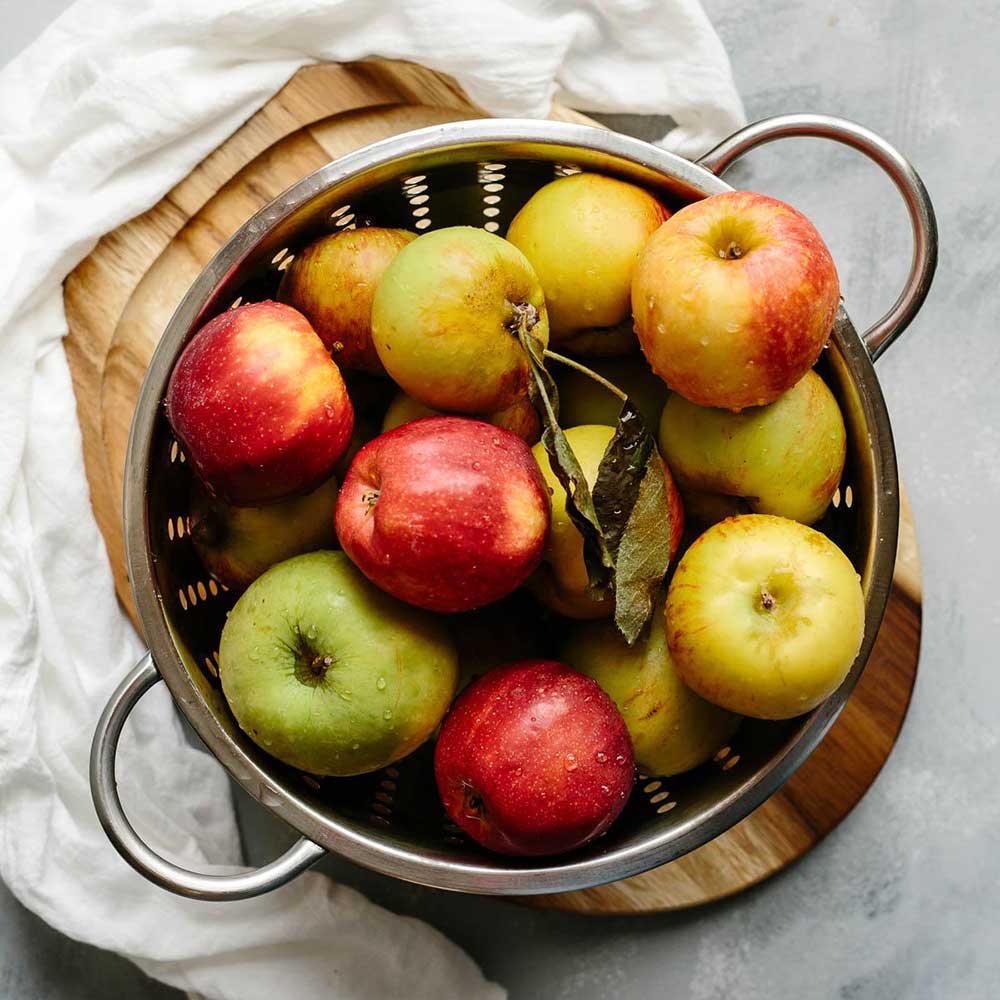Think of inflammation as your body’s defender against harm like infections or injuries. Inflammation appears as redness, warmth, and swelling where there’s trouble. Your body sends special cells to fix it. But if you have chronic inflammation that sticks around too long or affects your whole body, it can lead to inflammation-related health issues like heart disease, diabetes, and joint pain.
So, it’s crucial to control it to stay healthy. But here’s the good news: an anti-inflammatory diet and lifestyle can help, and the right foods can make you feel better. Starting with a delicious anti-inflammatory carrot ginger soup. But first, let’s learn a little more about inflammation and how you can fight it.
What is Inflammation
Inflammation is the body’s natural response to injury or illness. In the short term, inflammation is a good thing! It’s how our bodies heal wounds and fight off a cold. For example, when germs show up at our door, our immune system snaps into action–inflammation activates and sends them packing. Typically our bodies can start and stop the inflammatory process as needed.
Sometimes the body has trouble stopping its inflammatory response and the immune system stays activated without injury or illness present. If inflammation continues over time–sometimes referred to as chronic inflammation–it can damage parts of the body and increase our risk of some diseases.
General Nutrition Tips to Fight Inflammation
Eat the Rainbow
Fruits and vegetables are loaded with vitamins, minerals, and phytochemicals all of which play important roles in the way our body fights damage from inflammation.
Phytochemicals are compounds that plants create to protect themselves. When we eat plants, we reap the benefits of these protective compounds too! Phytochemicals give our fruits and vegetables their bright hues–like purple anthocyanins, red lycopene, green chlorophyll, and yellow anthoxanthins. The more colors we consume, the more protective compounds we get!
There’s no one fruit or vegetable that you need to eat to get the anti-inflammatory benefits of plants. In fact, the more variety, the better! Here are some options to consider:
Vegetables: broccoli, cauliflower, eggplant, zucchini, summer squash, chayote, bell peppers, okra, kale, collard greens, callaloo, cabbage, bok choy, string beans, pea pods, mushrooms, cucumbers, carrots, tomatoes, asparagus, brussels sprouts, artichokes, and lettuces.
Fruits: apples, pears, peaches, nectarines, plums, oranges, grapefruits, strawberries, blueberries, raspberries, blackberries, cherries, figs, cantaloupe, honeydew, and watermelon.
Talk to your Registered Dietitian for tips on how to incorporate your favorite fruits and veggies into more meals and snacks; or for help experimenting with new options!
Say Yes to Healthy Fats
Unsaturated fats can help fight inflammation in the body; and are easy to spot in many aisles of your local grocery store. You may have heard of “omega 3’s” or “omega 3 fatty acids” — this refers to a type of unsaturated fat that is particularly beneficial when eating to manage inflammation.
Fatty fish are packed with omega-3. If you eat seafood, aim for at least two 4-ounce servings of options like salmon, sardines, mackerel, or trout weekly. Canned, frozen or fresh are all great.
Not a seafood lover? No problem! You can get omega-3s from plant foods like walnuts, flax seeds, chia seeds, hemp seeds and soybeans.
If you limit these foods due to allergies or food preferences, your Registered Dietitian may recommend a supplement.
Other unsaturated fats can also aid in the fight against inflammation. Enlist them by putting the following foods in your regular rotation:
- Nuts like almonds, pecans, cashews, hazelnuts, pistachios and brazil nuts
- Seeds like sunflower seeds and pumpkin seeds
- Avocado and avocado oil
- Olives and olive oil
Lean into Lean Proteins
Opt to meet most of your protein needs with seafood, poultry, eggs, and plants, of which the types mentioned below are considered anti-inflammatory protein sources. Lean proteins are lower in saturated fat than red meats and processed meats, which should be limited to reduce inflammation.
Fatty Fish: A 2020 meta-analysis published in Nutrients analyzed 40 studies to assess the impact of fish consumption on heart disease. The study indicated that adding 20 grams of fish to your daily diet (under 1 ounce) could lower the risk of heart disease or death from it by 4%. For optimal health benefits, the authors suggested consuming 2 ounces of fish each day. Tuna, salmon, sardines, and mackerel are great sources of anti-inflammatory omega-3 fatty acids and protein..
Beans and Legumes: Recent research has found that legumes contain helpful compounds like peptides, polyphenols, and saponins. These substances have various health benefits, including fighting inflammation and acting as antioxidants. Beans, lentils, peas, chickpeas, edamame are great options.
Nuts: A 2023 review published in Nutrients, found that certain nuts, like almonds and walnuts, can help reduce inflammation, while others, such as Brazil nuts, may help manage oxidative stress. Tree nuts and peanuts, rich in powerful nutrients like MUFAs, PUFAs, vitamin E, selenium, and copper, as well as beneficial non-nutrients such as fiber, polyphenols, and phytosterols, may help lower inflammation and oxidative stress.
Spice Things Up
Herbs, spices and alliums (aka onion and garlic) aren’t just tasty ways to flavor your food–they’re also anti-inflammatory! These plants develop compounds to protect themselves and, when we eat them, they protect us too.
Here are tips to add more inflammation fighting flavor into your daily routine:
- Add cinnamon to your oatmeal, smoothie or yogurt in the morning.
- Use dried turmeric powder or fresh grated turmeric root in a stir fry, curry or stew. Adding some black pepper to the mix can improve absorption of curcumin, the active compound in turmeric.
- Boil water with sliced turmeric root, sliced ginger root, and a cinnamon stick to make a warming tea.
- Mix fresh herbs like basil, mint, dill, parsley and cilantro into homemade salad dressings, cooked grains, bean salads or slaws to brighten up your homemade meals.
- Add chopped garlic to sauteed vegetables. If you like it spicy, throw in chili peppers as well – capsaicin, the compound that brings the heat, also has anti-inflammatory properties.
Go for Whole Grains, Starchy Vegetables and Legumes
When choosing carbohydrate sources for your meals and snacks, these three options will give you the most inflammation-fighting benefits. We owe this, once again, to the power of plants, which deliver phytochemicals along with vitamins, minerals, fiber and even some unsaturated fats. Here are some inflammation-fighting foods to add to your grocery list.
Whole grains: Brown rice, oats, barley, farro, millet, quinoa, bulgur and buckwheat; and breads, pastas, and tortillas made from 100% whole grain flour.
Starchy vegetables: Corn, potatoes, sweet potatoes, winter squash, parsnips and pumpkin. Try a variety of colors within each category whenever possible (hello purple sweet potatoes and blue corn).
Legumes: Peas, lentils, chickpeas, and all types of beans (ie black beans, pinto beans, kidney beans, black eyed peas, butter beans, lima beans, cannellini beans, and mung beans).
The Best Anti-Inflammatory Carrot Ginger Soup
Give your health the boost it needs with this flavorful, healing carrot ginger soup, packed with anti-inflammatory foods like turmeric, ginger, oranges, carrots, and thyme – which we’ll break down here for you! It’s not only a flavorful treat but also gluten-free and dairy-free, making it a perfect addition to your batch-cooked recipes. Indulge in the goodness of this nourishing carrot ginger soup, a tasty weapon in the fight against inflammation.
Anti-Inflammatory Carrot Ginger Soup: Nutrition Facts
Curcumin
Curcumin is a chemical compound that gives turmeric its bright yellow hue. It’s best known for its potent anti-inflammatory properties and may have beneficial effects on various health conditions, including autoimmune diseases like ulcerative colitis and crohn’s disease, endometriosis, liver disease, and may also have therapeutic benefits for skin health and more.
Studies have found that curcumin may help fight major depression through several mechanisms, including those associated with monoaminergic (MAO) activity, immune-inflammatory and oxidative and nitrosative stress pathways, hypothalamus-pituitary-adrenal (HPA) axis activity, and neuro progression.
Keep in mind that turmeric only contains about 3% of absorbable curcumin. You can maximize absorption by pairing turmeric with black pepper. Consider taking a high-quality curcumin supplement if you are using turmeric to help treat any of the disease conditions listed above.
Ginger
Ginger has a long history of use in alternative medicine. Gingerol is the main bioactive compound responsible for many of ginger’s medicinal properties. Gingerol has powerful anti-inflammatory and antioxidant effects, according to research. It also contains essential nutrients like vitamin C, which supports the immune system and potassium which helps regulate blood pressure.
Ginger’s unique properties have been found to have beneficial effects for nausea and vomiting,, morning sickness, metabolic syndrome, and menstrual pain. In addition to gingerol, shogaol, paradol, and zingerone are also therapeutic compounds in ginger that give the spice its anti-inflammatory effect. Ginger is best when consumed fresh. That said, high-quality supplements and essential oils are also options for higher dose ginger treatments.
Beta-Carotene
Beta-carotene is the pigment that gives plants their yellow and orange color. When ingested, beta-carotene converts to vitamin A, an antioxidant and anti-inflammatory essential nutrient that protects our cells from damage by free radicals. It’s best to get beta-carotene from food because supplements have a high risk of toxicity. Carrots, spinach, sweet potato, pumpkin, and mango are some of the best sources of beta-carotene. Pair these foods with healthy fats to increase the absorption of beta-carotene.
Oranges
Oranges are among the best sources of vitamin C, a potent anti-inflammatory compound that fights free radicals, supports immunity, and combats cancer. Just one orange gives you more than your recommended daily allowance (RDA) of vitamin C. Recent research has also identified several phytonutrients in oranges that have additional healing properties, including citrus flavanones, hesperidin, anthocyanins, hydroxycinnamic acids, and a variety of polyphenols. Most of the phytonutrients in oranges are in the peel and inner white pulp of the fruit, not the liquid orange center. The pulp is a great source of beta-carotene and vitamin C.
Thyme
Thyme, a member of the mint family, is a popular culinary ingredient that contains potent plant compounds. It possesses anti-inflammatory, antimicrobial, and antioxidant properties that contribute to better health.
The positive effects of thyme can be credited to a variety of polyphenols like thymol, standing out as a powerful antioxidant. Thymol’s role as an antioxidant works against harmful molecules known as free radicals, which are culprits in promoting inflammation and various health issues.
Furthermore, thyme is a rich source of essential minerals crucial for overall well-being, including potassium, iron, magnesium, and selenium. In the kitchen, both fresh and dried thyme complements a wide array of dishes. And as a bonus it adds great flavor to meats, stews and pasta dishes and is a go-to herb for enhancing the taste of hearty, tasty soups.
Want to adopt an anti-inflammatory eating routine? Contact us to work with a Culina Health registered dietitian and get started on your journey.
Anti-Inflammatory Carrot Ginger Soup Recipe

Anti-Inflammatory Carrot Ginger Soup
Ingredients
- 1 medium onion finely chopped
- 2 cloves garlic finely chopped
- 1 tbsp freshly peeled & grated ginger
- 2 tsp ground turmeric
- 1 tsp sea salt
- 1 pinch ground black pepper
- 1 lb carrots peeled and chopped (500g or 7 large carrots)
- 1 cup unsweetened coconut milk
- 3 cups organic vegetable stock or bone broth
- zest and juice of 1 orange
- 2 sprigs fresh thyme
- Optional Ingredients
- chopped toasted almonds
- coconut yogurt or organic plain Greek yogurt
Instructions
- In a large saucepan, heat a dash of water over medium heat. Add in chopped onion and sauté until it begins to brown, about 5 minutes. Continue to add some water here and there to avoid sticking, which will help to deglaze the pan and further the caramelization of the onion, without the need of oil. This step is important to allow the full flavor of the onion to develop.
- Add in the garlic, ginger, turmeric, salt, pepper, and orange zest into the onions and continue to sauté the mixture for another 2 minutes.Then add in the chopped carrots and sauté for 3 more additional minutes, adding small amounts of water if needed.
- Move on to adding in the organic vegetable stock, coconut milk, and freshly squeezed orange juice. Bring to a boil, then lower to a simmer until the carrots are thoroughly cooked, about 20-25 minutes.
- Using a high speed blender, puree the soup in batches and add more salt and ginger if needed.
- Reheat back in the saucepan, where you can add in more vegetable stock if you prefer a thinner consistency.
- Divide into bowls and top with recommended optional toppings and enjoy! You can store leftovers in the fridge for up to a week, which makes this recipe great for batch cooking, or freeze for up to 3 months. Feel free to sub fresh ginger for 1 teaspoon of ground ginger, but we recommend using fresh ginger for the best flavor profile. You can add 1-2 scoops of collagen powder to this recipe to make it higher in protein.
Notes
More Anti-Inflammatory Recipes to Love:
Want more anti-inflammatory goodness? Here are a few more recipes that pack a nutritional punch.
Roasted Cauliflower and Potato Curry Soup
Why we love it: Cinnamon, turmeric, garlic, ginger, olive oil, carrots, and sweet potatoes all have anti-inflammatory properties. Plus, you’ll get additional heart health benefits from the monounsaturated fats in olive oil, and additional anti-inflammatory properties from cruciferous cauliflower.
Golden Dal with Gingered Tomatoes
Why we love it: Turmeric, ginger, tomatoes, carrots, golden beets, and orange bell peppers are all anti-inflammatory, and orange and red vegetables are also high in beta-carotene. Plus, red lentils are high in fiber, as well as play a role in supporting a healthy microbiome, which helps support our immune system.
Berry Banana Kefir Bowl
Why we love it: Berries are anti-inflammatory and rich in antioxidants, while bananas are jam-packed with potassium, which supports heart health, the nervous system and muscular function. Plus, kefir contains probiotics which are great for microbiome/gut health and immunity.
Unsweetened cocoa powder is anti-inflammatory!
Mediterranean Baked Sweet Potatoes
Why we love it: Sweet potatoes are a great source of fiber ane beta carotene, which has anti-inflammatory properties and is an important nutrient for immunity. Meanwhile, chickpeas are a great source of heart-healthy soluble fiber, while garlic, tomatoes, and red onion all have anti-inflammatory properties.
Herbal Chamomile Health Tonic
Why we love it: Ginger has anti-inflammatory properties, while lemon is rich in vitamin C, which supports immunity and is also anti-inflammatory. Rosemary also has anti-inflammatory properties, and minimally-processed honey also contains anti-inflammatory properties and antibacterial properties.
Any general advice posted on our blog, website, or application is intended for reference and educational purposes only and is not intended to replace or substitute for any professional medical advice, diagnosis, treatment, or other professional advice. If you have specific concerns or a situation arises in which you require medical advice, you should consult with an appropriately qualified and licensed medical services provider.





